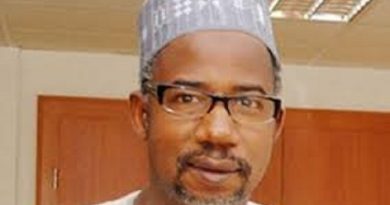Nigeria Technically Now At War, Says Senate Committee
A Senate ad-hoc committee has reflected on the mounting security challenges facing Nigeria and concluded that the country is technically at war.
However, as part of efforts to find the solution to the insecurity in the country, the Senate will tomorrow discuss the recommendations of its committee on security and take a definite stand on addressing the menace.
A 17-man Senate Ad-hoc committee on nation’s security challenges, headed by the Senate Leader, Senator Yahaya Abdullahi, in concluding that the country is technically at war, called for simultaneous operations by security agencies to dislodge the bandits, terrorists, and criminals from their hiding places.
According to the recommendation of the committee, which was inaugurated in February by the President of the Senate, Dr. Ahmad Lawan, there is a need for national mobilization “to immediately overcome the resurgent Boko Haram insurgency and the murderous atrocities of bandits, kidnappers in Nigeria’s rural and urban space.”
It, therefore, suggested the appointment and support of local/traditional authorities in local communities by re-building residences, school, clinics, roads, police stations, and barracks, that where destroyed by bandits “in order to root out the twin evils of kidnapping and banditry, which are beyond politics because they pose an existential threat to the nation.”
The committee stressed the need to adequately equip troops to serve as a counterforce to the activities of Boko Haram insurgents.
“With the insurgents using cheap commercial drones to survey our troop positions for attack planning, it is only a matter of time before they use their ISIS connections to weaponize them with explosive payloads similar to what ISIS is using with devastating efficiency in Syria, Iraq, and Kurdistan.
“It is therefore imperative that the Army be equipped with drone detection and incapacitating technology in the form of anti-drone systems, which can jam radio frequencies used to control drones, causing them to fall out of the sky uncontrollably or even utilize laser beams to burn aerial drones causing internal systemic failure.
“Fixed systems covering large areas can be used to protect barracks, super camps, stadia, VIP venues while vehicle-mounted mobile systems can accompany troops provided ad-hoc protection. There are also portable units in the form of jammer rifle that can incapacitate drones from long distance for on the move protection,” it said.
The committee also called on the air force to assert its aerial capability towards bombing identified cells of insurgents and bandits.
“As a matter of necessity, the air force must assert its superiority in the skies by embarking on constant and debilitating air raids on insurgent and bandit camps and supply channels to ensure near-complete annihilation of men and resources and wipe out their capacity to regroup or coordinate their cells for combined aggression.
“The same aircraft can be used to provide close air support for ground troops and deployed for intelligence gathering, search, and reconnaissance. We must find a vacuum filling alternative for the super Tucano order for immediate deployment as it is apparent that the unending delays and the new delivery date of 2022 for the US orders may simply be another ploy. There are alternative high endurance turbopumps within the eastern bloc that can fill in the gap,” it added.
The committee also recommended that all joint operations should be carried out strictly in accordance with extant operational procedures provided in the Armed Forces Act.
It advised the federal government to fully pay allowances to officers and men involved in operations; introduce effective insurance scheme, gratuity, and pensions; as well as set up a National Defence Fund backed by legislation, into which all Nigerian adults and businesses should make contributions for revival and investment in the National Defence Industry.
The Senate will tomorrow at plenary debate all the aforementioned recommendations and take a position on the matter, which will then be forwarded to the executive for implementation.



